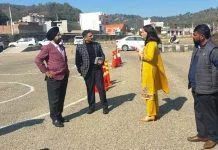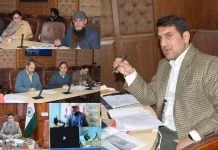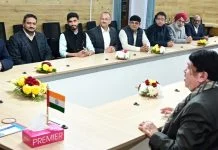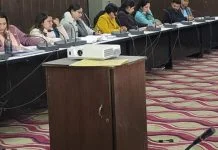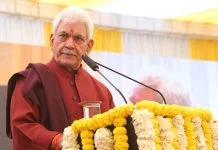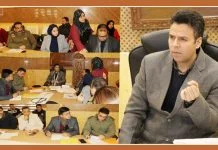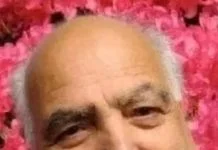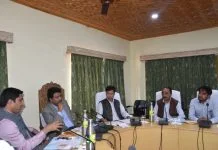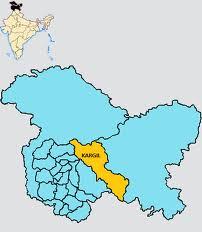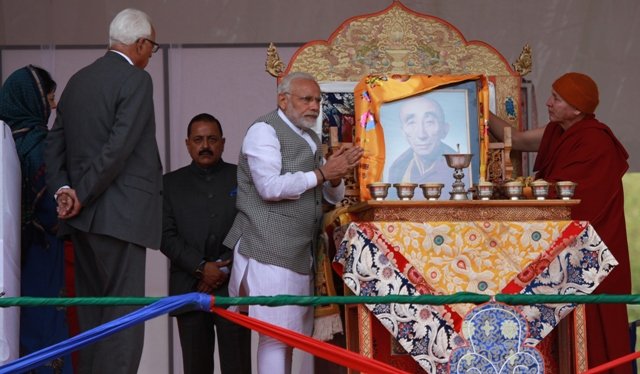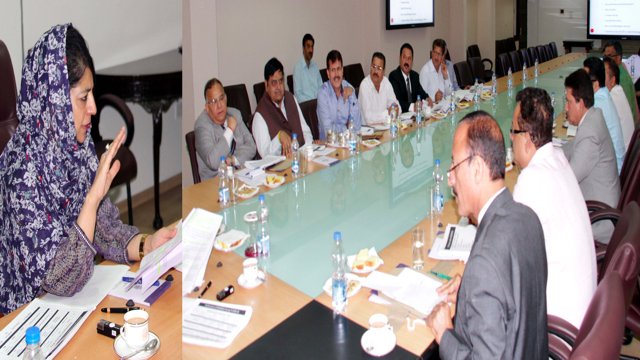Stressing upon empowerment of people at the grass roots’ level, Chief Minister, Mehbooba Mufti, today said the prime objective of all rural development programmes must be to improve the quality of life in our villages, where a major chunk of the state’s population resides.
The Chief Minister said the idea of convergence will yield better results if more departments are involved in assets’ creation in rural areas, thereby resulting in economic betterment of people as well as social transformation. “There has to be efficiency and greater transparency in utilization of funds so that we eliminate poverty, unemployment and underdevelopment in our rural belts,” she stated.
The Chief Minister was speaking during a high-level review meeting of the Rural Development Department (RDD), at the Civil Secretariat today.
Besides Minister for RDD, Abdul Haq Khan, Chief Secretary, B. R. Sharma, Financial Commissioner, Planning & Monitoring, B. B. Vyas, Principal Secretary to the Chief Minister, Navin. K. Chaudhary and Secretary, RDD, Khursheed Ahmad Shah, attended the meeting.
Linking state’s progress with the growth of its vast rural areas, the Chief Minister observed that there will be better prospects of economic growth if people at the panchayat-level are actively involved in various development schemes. Appreciating the RDD for its initiative under convergence model, she said the results will be more encouraging if other departments are taken under its wings. “RDD needs to widen the scope of convergence by tying up with Tourism, I&FC, H&UDD as well as other departments to create sustainable infrastructure in our villages,” she added.
The Chief Minister observed that our villages need to grow in tandem with the rapidly-progressing cities and towns and added that only then the standard of life will improve and inclusive growth will happen in rural areas of the state.
Highlighting the need to make the functioning of RDD’s flagship social security programme, MNREGA, more effective, Mehbooba Mufti also suggested linking of its labour-component with I&FC and PHE departments in the first instance. To bring in more transparency in disbursement of wages, she also issued instructions for making Aadhar-based enrolment mandatory for all MNREGA workers.
The Chief Minister desired that revival and conservation of small water-bodies and creation of green spaces by planting trees where rural infrastructure is coming up should also be explored under MNREGA.
Secretary RDD informed the meeting that the process of Aadhar-linked enrolment has been launched and all job-card holders will be registered by the end of November this year and displayed on the Department’s website. On convergence initiatives like Project Rahat, successfully launched in Udhampur for connecting remote rural pockets by construction of small bridges, he said proposals worth Rs.50 crore have been framed, largely from the availability of resources from 13th FC. These, he said will be taken up for creation of durable assets mainly in flood protection structures, development of play-fields, connectivity, check dams & land protection, construction of CFCs and training centres.
Against total availability of Rs.785.44 crore in 2015-16 under MNREGA, Rs.778.23 crore have been utilized with generation of 3.46 crore mandays, which exceeded the fixed target of 3.11 crore. Out of the employment generated for 10.40 lakh workers, 3.80 lakh were women.
An allocation of Rs.805.80 crore has been made for the current financial year under MNREGA.
Emphasizing upon housing for rural poor as a priority area, the Chief Minister issued directions for prominently displaying names of all Pradhan Mantri Awas Yojana (PMAY) beneficiaries at all Panchayat Ghars to ensure transparency. Now that the earlier IAY scheme has been revamped, she urged the RDD to ensure the intended beneficiary gets a good-quality house to live in. “It is vital that the names of beneficiaries are brought into public domain so as to remove doubts that may emerge in the process of selection,” she added.
It was revealed in the meeting that entire rural housing scheme has been revamped with allocation in hilly and difficult areas enhanced from Rs.75,000 to Rs.1.30 lakh. In addition, Secretary RDD said government will also make available cost of unskilled labour for 95 days from MNREGA and another Rs.12,000 from Swach Bharat Mission for toilets to facilitate the beneficiary.
Navin. K. Chaudhary informed the meeting of an additional allocation of Rs.400 crore which had been transferred to all the panchayats in the state. He said the RDD department needs to prepare guidelines so that the funds are judiciously utilized to alleviate rural poverty by focusing on areas like drinking water, housing and construction of roads.
While reviewing the performance under National Rural Livelihood Mission (NRLM) – UMEED, a poverty alleviation and women empowerment programme, Mehbooba Mufti directed RDD to bring the six uncovered districts under the ambit of the scheme this year. She said keeping in view the high success rate of women in Self Help Groups (SHGs), empowering women by forming cooperative linkages will hugely transform the rural landscape in the state. “RDD can start by incentivizing volume production of jute bags, cut flowers and milk cooperatives under SHGs for which the state government can provide marketing support by roping in government departments as well as private firms,” she added.
During 2016-17, 22 more blocks and the remaining six districts will be covered under UMEED. As many as 9,861 women have been federated into SHGs, against a target of 90,000 covering nine lakh rural households over the next five years. These SHGs have been provided linkage with financial institutions with an interest subvention of 5 to 7 per cent.
The RDD is targeting Rs.80 crore funding under UMEED to achieve the target of 8,000 more SHGs by involvement of 88,000 women. Under convergence with MNREGA, 7000 cowsheds and composite deposits will be provided to women, thereby adding value to their livelihood.
The Chief Minister also reviewed the performance of Integrated Watershed Management Programme (IWMP). She was informed about the perspective and strategic plans to treat 998 micro-sheds along with 15.33 lakh ha of land till the end of 14th Five Year Plan.
So far, the Union Ministry has sanctioned 159 projects at a cost of Rs.970.72 crore, out of which DPRs have been prepared for 82 projects.
The Chief Minister was also apprised by RDD Secretary about the achievements of the department under Swach Bharat Mission, marketing support to rural artisans and guidelines for utilization of funds under 14th Finance Commission. He also highlighted the focus areas of 2016-17 under its Convergence Plan which include renovation and de-silting of water-bodies, road-side plantation of trees, developing vermi compost, footbridges, farms ponds, development of play-fields, construction of check dams and livelihood support works.
Also present in the meeting were Director RDD, Kashmir, Tasaduq Jeelani, Director RDD Jammu, Kuldeep Raj Khajuria and Mission Director, NRLM, Dr. G. N. Qasba.


